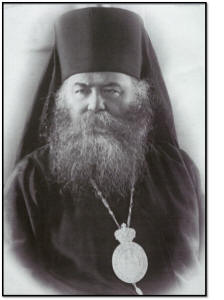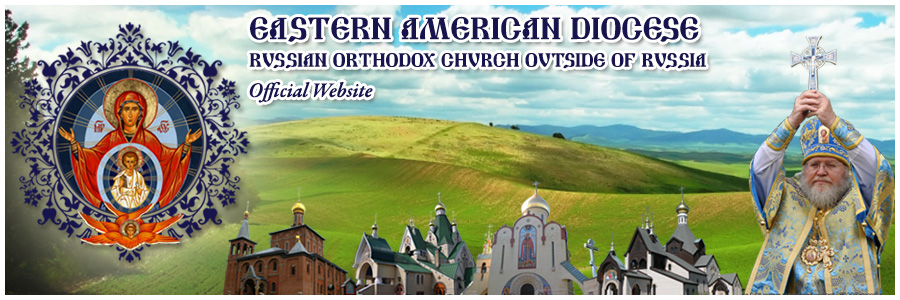June
19, 2013
"The
Restorer
of
Canonical
Order
in
North
America:"
On
the
80th
Anniversary
of the Repose of Archbishop Apollinary (Koshevoy)
 Wednesday,
June 19 marks the 80th anniversary of the repose of Archbishop
Apollinary (Koshevoy), at one time ROCOR’s Archbishop of North
America & Canada, and one of the most significant and heroic figures
in the history of the Church Abroad in the United States.
Wednesday,
June 19 marks the 80th anniversary of the repose of Archbishop
Apollinary (Koshevoy), at one time ROCOR’s Archbishop of North
America & Canada, and one of the most significant and heroic figures
in the history of the Church Abroad in the United States.
Archbishop Apollinary was born in Poltava in the Russian Empire. He
was well educated, having graduated from the Poltava Seminary and
the Kazan and Kiev Theological Academies. In 1917, he was
consecrated Bishop of Rylsk, vicar of the Diocese of Kursk, and in
1919 was appointed ruling bishop of the newly established Diocese of
Belgorod. He was forced to flee the Bolsheviks, and in 1924, after
having spent two years in Jerusalem, was appointed Bishop of
Winnipeg, vicar of the Diocese of North America. He was witness to
(though not a participant of) the Detroit Sobor which, under the
ambitious direction of Metropolitan Platon (Rozhdestvensky) of North
America & Canada, declared the autonomy of the Russian parishes from
the ROCOR Synod of Bishops (est. 1922) in Serbia.
On June 27, 1926, the ROCOR Sobor requested that Metropolitan Platon
renounce claims of American autonomy and separation from the
Patriarchal Locum Tenens
and the Russian Church Abroad. Metropolitan Platon refused, and on
September 10, replied on behalf of the bishops in America: "The
authors of this Message recognize neither ‘Synod’ nor ‘Sobor.’…
There are ‘Russian bishops in Karlovci,’ refugees, who abandoned
their flocks and, in so doing, rent themselves from the body of the
Church. Of their own volition, they then united into the so-called
Synod and Sobor, which carry no canonical significance whatsoever."
Metropolitan Platon wrote this, despite having recognized ROCOR’s
canonical authority thitherto, and come before the Sobor in Serbia
to justify his actions.
Then-Bishop Apollinary, recognizing the canonical disorder and
impropriety at work, and honoring the resolution of the ROCOR Synod,
refused to recognize the self-proclaimed "autonomy" of the Russian
Church in America any longer. Showing great faith and fortitude, he
was the only hierarch to stand against the powerful Metropolitan
Platon and, as a result, he was "deposed" by the American Church,
banned from serving, and run out of his hierarchal residence with
the clothes on his back. As he wrote later, "I was driven away from
the dinner table, which was already prepared and the foods set out…
with the words: ‘We cannot share with you even a piece of bread!’"
In response, the Synod, which annulled his "deposition" and
appointed him ruling bishop in America in 1927, assigned him the
daunting task of restoring canonical order and bringing the lost
Russian parishes back into the fold. At the time, he did not possess
a single church: his first services were held in a private home. In
1929, he was elevated to the rank of archbishop. His work and many
tribulations exhausted him, and he fell asleep in the Lord only six
years into his final ministry, on June 19, 1933. Despite persistent
legal and moral opposition from the Metropolia, by the time of his
repose he had returned 62 parishes to the bosom of the Orthodox
Church.
Archbishop Apollinary has had another long lasting legacy in ROCOR,
as well. As His Grace, Eastern American Diocesan vicar Bishop George
of Mayfield, noted:
"In Jordanville, Archbishop Apollinary is considered one of the
founding fathers of Holy Trinity Monastery. It was he who gave Fr.
Panteleimon and (later) Archimandrite Joseph the blessing to buy the
land and start the monastery. If you go to the monastic cemetery
behind the church, you will see that he is buried directly behind
the altar, with Frs. Panteleimon and Joseph on his right and left.
He stood up for canonical order and the unity of the Russian
Orthodox Church here in America, and was persecuted for it. We honor
him as our father and a confessor of the Faith."
On this day, please pray for the repose of the servant of God
Archbishop Apollinary. May his memory be eternal!
Media Office of the Eastern American Diocese


